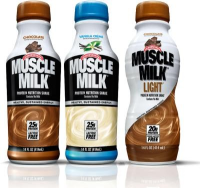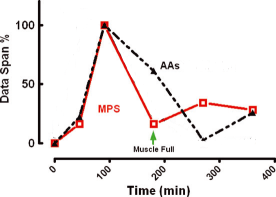It is said that you should eat protein every 2-3 hours because protein synthesis only last 2-3 hours and your body can only absorb so much protein. So it is typical to see bodybuilders and serious athletes drink or eat protein or amino acids every 2-3 hours.
The infusion study is only applicable to patients who gets protein infusion.
| Thu March 15, 2012
This is very interesting thanks for summarizing this research! I’ve likewise seen research noting that 20-25 grams of protein may be optimal for muscle protein synthesis.
Bodybuilders often ask if we can only absorb 35-40 g protein per meal. Ive never been able to find proof of this. When you said protein above 20 grams was oxidized, are you meaning that the the amino acids in that protein are no longer able to be used by the body?
Would the oxidation of amino acids be a factor of total calorie intake (ie less breakdown in a less well nourished individual). I suspect it might be.
Another great review thanks!
| Thu March 15, 2012
Nice article, Anoop
I think that Layne Norton have said it for years
Anoop | Thu March 15, 2012
Hi Anatoly,
Thanks!!
I have read Layne’s article. The only problem was that he was using the infusion study and a rat study that he did. He doesn’t even mention that his study was on rats.One large reason I never used it here. And me and Karky talked about this in the comment section of the post workout carbs article couple of years back.
I was waiting for a study which used an oral dose of protein. This oral protein study was published early 2011. I just feel lot more confident after I read the to write an article with practical application. And they are looking at a long term study.
| Fri March 16, 2012
I remember reading a study about this. The researchers had the subjects eat meals, but in between the meals (I think it was 1.5 or 2 hours after the first meal) they gave them whey protein, to see if they could “bust through” the muscle full effect. And they could.. the whey gave an increase in MPS. They didn’t have a group that tried to eat regular food instead of whey, though..
Unfortunately I didn’t save the study, but I’ll see if I can find it, it was pretty interesting.
Anoop | Fri March 16, 2012
H Joe,
Thanks for the comment.
What we know is that rate of protein synthesis is limited. It basically means that it is not the size of the sink, but the size of the pipe that matters. You can only push so much water through the pipe.So big muscle do not mean that more protein is better.
When you eat a regular meal, the amino acids are released slowly because of the time it takes to digest and such. So you can eat a lot more protein and it will release slowly into the blood stream. But if you are taking whey or amino acids, there is rapid absorption and the rest will get oxidized or used for making glycogen and such.
| Fri March 16, 2012
That looks like it, yes. Thanks anoop!
| Fri March 16, 2012
Are there any long term studies to comfirm that the ‘6 meals a day is better for muscle growth’ hypothesis? I remember some long term studies, but they did not show any significant difference. For instance:
Colker CM, Swain MA, Fabrucini B, Shi Q, Kalman DS. Effects of supplemental protein on body composition and muscular strength in healthy athletic male adults.
I personally have done the six meals a day thing for years and can’t say that it ever did anytime for me than alienate me from my friends…Going to 2-3 meals a day was the best choice I ever made in this regard.
This is not a scientific standpoint, but I feel the six times a day thing is totally bogus advise (in practise).
Do you eat six meals a day, Anoop?
Anoop | Fri March 16, 2012
Hi Fulldeplex,
Nope. I don’t think that study did anything remotely related to protein frequency.
This is something that people can easily try it out. If you don’t see a difference in 8-10 weeks, then it is not worth eating 6-8 times. Maybe if you are a bodybuilder, it might make a difference. or maybe if you are on roids, it might help. But looking the science, I think it maybe be well worth giving 3-4 meals a day a shot.
I always ate 3-4 meals. Even if 6-8 meals did show an increase, I wouldn’t really bother. It goes back what your goals and expectations are. That’s why they say evidence is not enough.
| Fri March 16, 2012
Yes you are right about the study. I seem to have cited the wrong study, but now I can’t find the study I meant to post. Oh well…
| Thu March 22, 2012
Dear Anoop,
I send you one mail where the expert says 15 gram before and 15 gram after the workout,is this fine?we all would like to know how much time whey protein would take to get into the blood stream and also let us know how much hour before the workout one should consume whey protein?
| Tue March 27, 2012
Good job Anoop!
The reason we are made to believe that we should have protein every 2-3 hours is because large supplement companies paid off researchers to make us believe this is the way to go to better market their products. Back in the hunter and gatherer days, they hunted all day and consumed one large meal at night snacking on fruits and vegetables throughout the day and these people were fit. Another example is prison mates. They are lucky to get 2,000 calories in a day and this is low quality meals however they still manage to stay cut and have muscle. Eating every 2-3 hours is also terrible on the digestive system as it doesn’t give it time to rest as it is always digesting food through out the day!
| Wed March 28, 2012
Hi Anoop,
Very interesting read !!!
Anoop | Wed March 28, 2012
H Jordan,
Thanks for the comment!
I think a large part of the reason was Bill Phillip in those days claimed that human body can only absorb so many grams of protein at a time. And this is true if you are doing infusion or amino acids. But when you eat steak and such, the digestions take time and it slowly releases the AA into the blood stream.
The hunter gatherer case is usually countered by saying if they had meals every 3 hours, they would have been even bigger. Not sure about the digestive system comment.
And you need to update your About page, Jordan:-)
And working out delays this muscle full effect.
Thanks Harish for the comment.
| Fri August 24, 2012
The prison example is a tad flawed…the big fellas likely take a little off the top of the smaller fellas as payment for protection.
The only question I have is with regard to this statement:
“How much protein: It has been shown that 20 gms of protein or 10 gms of EAA or 3.2 gms of lecuine is enough to maximize or saturate protein synthesis for an average person.”
Would this support the use of BCAA supplements? One such supplement that I recently started using,has a 8💯1 leucine-isoleucine-valine ratio. Does increasing the quantity of leucine make better use of the remaining aminos? I haven’t been using it long enough to determine whether it is making a difference…and I’m not even sure I’ll ever know for sure, but that statement makes me want to take another swig of the bcaa stuff.
Anyway, it’s a thought provoking article, thanks!
| Tue September 04, 2012
Hi Anoop,
good work. so does this mean that 2 gm of protein per kilo of bodyweight does not really work. you mean 40-50gm is enought for a bodybuilder who is trying to put some mass.
is there any studies to prove it.because other than a few articles ,all i can find is to have loads of protein,even for the legendary bodybuilders.
| Sat September 08, 2012
hi,
how much is the ideal gm of protein for a 200lb bodybuiler who is considering to put on muscle mass rather than maintaining it.
| Mon November 05, 2012
hi,
this is my third post .anoop ,your from kerala. plz help me out
Anoop | Tue November 06, 2012
Hey Guptha,
I am sorry I didn’t get back to you.
I don’t think I said anything about the amount of prote1n required per bodyweight. The article is about the frequency of protein. So whatever you are eating now you take it 3-4 times instead of 8-9 times. Makes sense?
Layne Norton does this. And he says he gained a lot.
| Sun November 11, 2012
thanks anoop.
| Thu August 22, 2013
In gyms that sell protein at 30%-50% profit, and sites that sell protein advertisements, you will not get very precise information on dosage.
guptha, if you are not VERY tall, you weight is near the natural maximum, so you will get very slow growth in any case. I doubt you will need more than 10gr protein over your maintainence at that point.
| Thu August 22, 2013
Nick,
thanks for that info..but does it mean that 1.25 gm or 1.5 gm or 2 gm of protein per kilo is advised.
| Mon November 05, 2018
For all info was good. I appreciate the writer research. I also add some more points.
three essential amino acids that are necessary for our muscle growth.
The names of the trio amino acids are:
1. Leucine
2. Isoleucine
3. Valine










